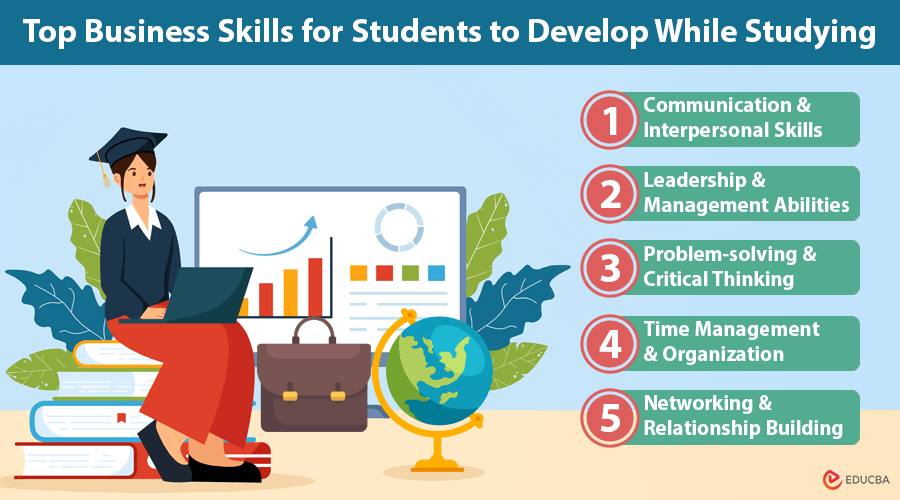
Essential Skills for a Successful Career
In the competitive job market, students must go beyond academic knowledge to secure a promising future. Employers now value a mix of technical expertise and soft skills, often called business acumen. Developing practical business skills for students during university or college can enhance their educational experience and improve their appeal to potential employers. Additionally, a professional paper writer can help students effectively communicate ideas while showcasing critical thinking abilities, making them more attractive to employers. This article will explore five key business skills to develop while studying to give them an edge when entering the workforce.
Top Business Skills for Students to Develop While Studying
Cultivating key business skills while studying can enhance employability and help students succeed professionally. Here are the top business skills students should focus on during their studies.
#1. Communication and Interpersonal Skills
Communication is the cornerstone of professional success. Whether it is presenting ideas, participating in discussions, or engaging in written exchanges, strong communication skills are vital for building relationships in business environments.
- Verbal and Written Communication: Students can improve their communication abilities through group discussions, class debates, presentations, and research papers. These activities help build written and verbal communication skills, which are crucial in any business setting.
- Interpersonal Connections: Effective interpersonal skills go beyond just talking. They involve understanding and responding to emotions, fostering strong relationships, and building trust with clients, colleagues, and collaborators. Networking events, internships, and collaborative projects provide students valuable opportunities to practice these skills in real-world business contexts.
#2. Leadership and Management Abilities
Leadership skills are not reserved solely for those in managerial positions. These skills benefit students regardless of their career paths, as they help with decision-making, conflict resolution, and team management.
- Developing Leadership Skills: Develop leadership through leadership roles within student organizations, clubs, or group projects. Students gain hands-on experience in motivating teams, delegating tasks, and managing conflicts—highly valued workplace skills.
- Entrepreneurial Potential: Leadership skills are crucial for those interested in entrepreneurship, especially when managing teams and making quick decisions. The ability to lead under pressure is an asset that employers and future business owners highly seek.
#3. Problem-solving and Critical Thinking
Problem-solving and critical thinking are crucial for overcoming challenges in the business world. These abilities help students analyze situations, generate solutions, and make informed decisions.
- Real-World Application: Students can enhance their problem-solving abilities through case studies, research projects, and analytical exercises. These assignments allow them to brainstorm multiple solutions and weigh the pros and cons of each option—key steps in strategic planning and innovation.
- Creative Solutions in Business: Strong problem-solving skills enable students to handle complex issues creatively, an ability employers look for when hiring. By honing these skills, students become confident in facing challenges and thinking strategically, which is essential for any business role.
#4. Time Management and Organization
Time management is a crucial skill for both students and professionals to master. Without proper time management skills, juggling academic assignments, part-time jobs, internships, and extracurricular activities can be overwhelming.
- Mastering Time Management: Students can develop time management skills by setting clear goals, using planners or digital calendars, and breaking larger tasks into manageable steps. These habits reduce stress and help students stay organized while meeting deadlines.
- Time Management in Professional Settings: Employers expect workers to use their time wisely, focus on important tasks, and meet deadlines with little supervision. By practicing these skills during their studies, students are better prepared for the demands of the professional world.
#5. Networking and Relationship Building
Networking is a key skill for career growth. Connecting with classmates, teachers, and professionals in your field can lead to job offers, internships, and helpful guidance.
- Effective Networking: Students who master the art of networking can gain insight into their chosen industries, learn about job openings, and build meaningful connections that can lead to professional opportunities after graduation.
- Long-Term Career Growth: Effective networking goes beyond immediate job opportunities; it fosters long-term career growth. Creating a solid professional network can open up new chances for working together, advancing your career, and personal growth.
Final Thoughts
Developing essential business skills should be a top priority as students prepare for their future careers. Communication, leadership, problem-solving, time management, and networking are all crucial skills that will serve students well in any professional setting. By focusing on these skills during their studies, students can position themselves for success in the workplace, enhancing their employability and standing out to potential employers. Ultimately, the business skills for students to develop while studying are valuable for securing a job and thriving in a dynamic and competitive business environment.
Recommended Articles
We hope this guide on business skills for students helps you develop the essential skills to excel in the professional world. Check out these recommended articles for more tips on building a strong foundation in business and leadership.

